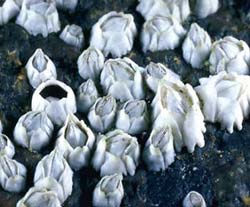New paints prevent fouling of ships’ hulls

Adult barnacles on a cliff.<br>Photo: University of Gothenburg<br>
In a joint project, researchers at the University of Gothenburg and Chalmers University of Technology, Sweden, have developed new environmentally-friendly and effective bottom paints to prevent this.
Fouling is a major problem, leading to higher fuel consumption and so increased air pollution. It can also cause the spread of alien species that do not belong in the local marine environment.
Effective biocides found
Researchers at the University of Gothenburg and Chalmers University of Technology have spent nine years developing new environmentally-friendly and effective antifouling paints through a joint research programme called Marine Paint.
The focus has been on a substance called medetomidine, which has proved highly effective against barnacles, considered to be the most problematic fouling organism.
To tackle other types of fouling as well (such as algae, mussels, sea squirts and moss animals), the researchers have developed a concept for producing optimised combinations of different antifouling agents, or biocides.
The idea behind these optimised blends is to combine many different biocides that are effective against different fouling organisms, and adjust the balance between them to eliminate all types of fouling.
To produce the recipes for these optimised blends, the researchers have also developed a model system where they weigh the effect of different biocides on different fouling organisms against their expected environmental risk. The blends are all equally effective but offer different levels of expected environmental risk.
Hi-tech paints
These optimised blends have been combined with hi-tech paint systems based on microcapsules – microscopic capsules made out of a polymer material which slowly release the biocides from the paint into the water.
Field trials of painted test panels at the Sven Lovén Centre for Marine Sciences in Kristineberg have shown that the concept of optimised antifouling blends in bottom paints works very well.
Marine Paint’s research results for medetomidine have been passed to the commercial partner I-Tech AB to ensure that they are put into practice, and the product is now being marketed under the name Selektope.
Marine Paint has been hosting a conference in Gothenburg on 14-15 May 2012 and presentED its results and placeD them in a wider context, with speakers and participants representing universities, colleges, industry, authorities, shipping companies, leisure boat owners and other interested parties, primarily from Sweden and Europe.
Summaries of the workshop presentations will be made available on Marie Paint’s wbsite www.marinepaint.se
The Marine Paint research programme was funded by the Mistra Foundation for Strategic Environmental Research from 2003 to 2011.
For more information, please contact: Programme director Thomas Backhaus
Telephone: +46 (0)31 786 2734
E-mail: thomas.backhaus@bioenv.gu.se
Media Contact
More Information:
http://www.gu.seAll latest news from the category: Life Sciences and Chemistry
Articles and reports from the Life Sciences and chemistry area deal with applied and basic research into modern biology, chemistry and human medicine.
Valuable information can be found on a range of life sciences fields including bacteriology, biochemistry, bionics, bioinformatics, biophysics, biotechnology, genetics, geobotany, human biology, marine biology, microbiology, molecular biology, cellular biology, zoology, bioinorganic chemistry, microchemistry and environmental chemistry.
Newest articles

High-energy-density aqueous battery based on halogen multi-electron transfer
Traditional non-aqueous lithium-ion batteries have a high energy density, but their safety is compromised due to the flammable organic electrolytes they utilize. Aqueous batteries use water as the solvent for…

First-ever combined heart pump and pig kidney transplant
…gives new hope to patient with terminal illness. Surgeons at NYU Langone Health performed the first-ever combined mechanical heart pump and gene-edited pig kidney transplant surgery in a 54-year-old woman…

Biophysics: Testing how well biomarkers work
LMU researchers have developed a method to determine how reliably target proteins can be labeled using super-resolution fluorescence microscopy. Modern microscopy techniques make it possible to examine the inner workings…





















